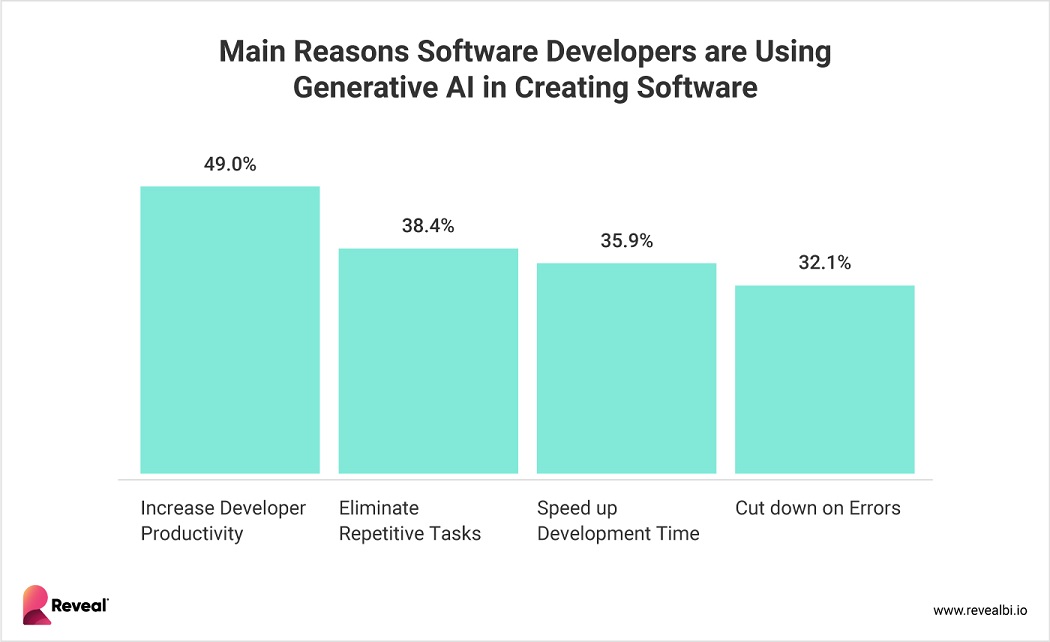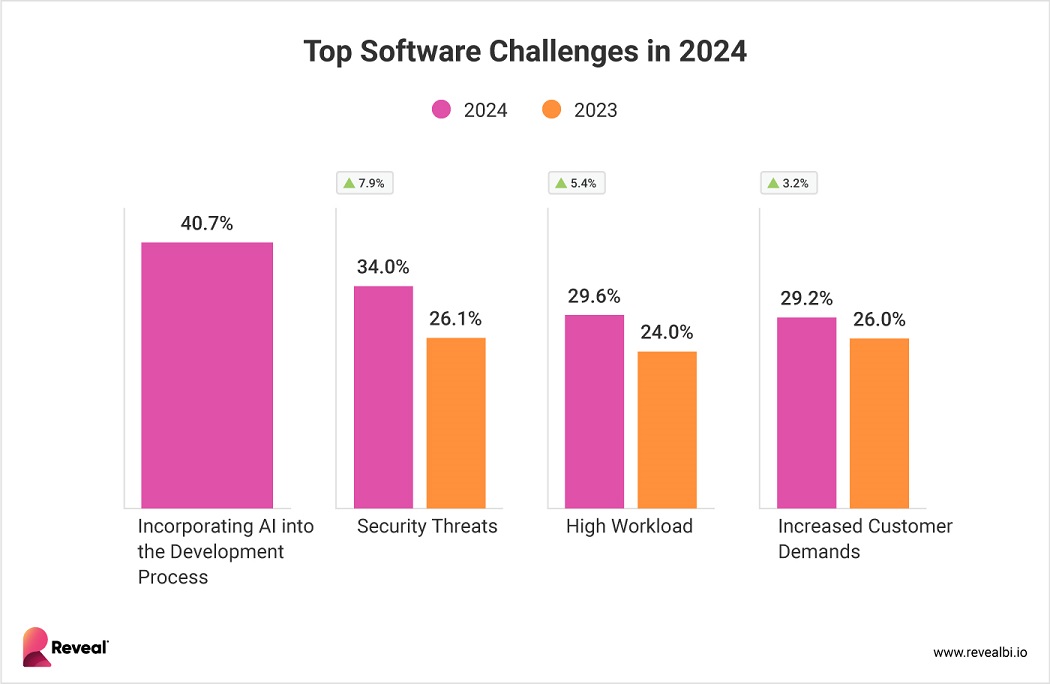GitLab announced the general availability of GitLab Duo with Amazon Q.
Reveal's annual survey of software developers identified a surging interest in two tools that are reshaping software development — Artificial Intelligence (AI) and embedded analytics. It's hardly surprising that AI technology has emerged as a dominant force, since it has already begun to revolutionize various domains, such as text and image generation, research, and learning. However, these uses are just the tip of the iceberg in terms of AI's potential impact.
Another cutting-edge technology, embedded analytics, has consistently demonstrated its value, prompting an increasing number of organizations to leverage its capabilities to remain competitive and facilitate data-driven decision-making. The survey found that almost three-quarters (73.2%) of software developers currently incorporate embedded analytics into their apps and 71.6% expect their organization's focus on business intelligence to expand in 2024.
The rise in AI integration and embedded analytics adoption signals a transformative era for software developers. Embracing AI holds the promise to enhance productivity and help resolve the developer shortage. However, it comes with risks, including security and privacy concerns.
The Future of AI
Four in ten developers (40.7%) indicated that incorporating AI into the development process will be their biggest software development challenge in 2024. According to the survey, the top reasons software developers are using generative AI in building software today are:
■ Increase developer productivity (49%)
■ Eliminate repetitive tasks (38.4%)
■ Speed up development time (35.9%)
■ Cut down on errors (32.1%)

Although AI has tremendous benefits, software developers still have concerns about integrating it into their workflows. Some say AI lacks the creativity and innovation of human developers, while others worry that code developed with AI may contain errors, bugs, or inefficiencies, and security vulnerabilities. There is also the concern that AI might make the developer's role obsolete.
However, despite these concerns, nearly half of the survey respondents (49.2%) plan to implement AI tools in 2024, compared to 27% in 2023.
There's no shortcut to implementing AI into your business. Because it is more than just another platform in your tech stack, AI requires an organizational shift. Some of the necessary shifts include centralizing your company's data, reskilling your team members, and ensuring they are comfortable with AI.
Here are some ways to prepare your organization and employees for the future of AI:
■ Invest in training and education: Provide training to improve employees' skills in using relevant AI tools and technologies.
■ Provide resources and support: Equip your employees with the necessary resources and support systems to experiment and learn how to utilize AI in their workflows effectively.
■ Create an AI-centric culture: Foster a culture that embraces AI innovation and encourages experimentation with new technologies.
■ Centralize your company's data: Establish a centralized data catalog and implement robust data governance practices to ensure data accessibility and quality.
■ Implement effective change management strategies: Start small and take it step by step to facilitate a smooth transition in which everyone is happy and comfortable.
Embedded Analytics Adoption
Organizations are constantly looking for the best ways to extract more value from their data and improve their business decision-making, a quest that has led to the rise of embedded analytics.
The survey found that almost three-quarters of software developers (73.2%) currently incorporate embedded analytics into their apps, and 71.6% expect their organization's focus on business intelligence to increase in 2024.
The top reasons software developers are integrating embedded analytics/business intelligence tools are to make better business decisions, improve productivity, and increase sales/revenue, the survey found.
When it comes to challenges, however, organizations may encounter obstacles such as integration complexity, data security concerns, and the need for specialized expertise in implementing and managing embedded analytics solutions.
To address these challenges, organizations should prioritize thorough planning and strategic deployment of embedded analytics. Choosing the right vendor can be challenging. To ensure a seamless fit, start by defining your objectives, identifying your audience, defining the scope of your deployment, identifying the data sources that will be connected to the BI solution, and determining your budget. This will help you determine which vendors meet your needs.
Software Development in 2024 and Beyond
The survey also identified software developers' biggest pain points, challenges, and areas for growth. The survey found that the biggest software development challenge in 2024 is the integration of AI. Other challenges include surging security threats (34% in 2024 vs. 26.1% in 2023), high workload (29.6% in 2024 vs. 24% in 2023) and increased customer demands (29.2% in 2024 vs. 26% in 2023).

The survey found that the biggest business challenge will be working with limited resources (40.9%), surpassing the primary concern of the past two years — recruiting developers with the right skills — which now takes second place, indicated by 34% of respondents.
Conclusion
Software development continues to evolve, presenting both challenges and opportunities for developers and their organizations. As you navigate transformative digital trends, it is evident that preparation is the key to success.
To fully embrace the opportunities that AI and embedded analytics present, a proactive approach involving both technology and organizational readiness is required. By prioritizing the necessary preparation, your organization becomes better positioned for a smooth transition within the changing landscape of software development.
Industry News
Perforce Software and Liquibase announced a strategic partnership to enhance secure and compliant database change management for DevOps teams.
Spacelift announced the launch of Saturnhead AI — an enterprise-grade AI assistant that slashes DevOps troubleshooting time by transforming complex infrastructure logs into clear, actionable explanations.
CodeSecure and FOSSA announced a strategic partnership and native product integration that enables organizations to eliminate security blindspots associated with both third party and open source code.
Bauplan, a Python-first serverless data platform that transforms complex infrastructure processes into a few lines of code over data lakes, announced its launch with $7.5 million in seed funding.
Perforce Software announced the launch of the Kafka Service Bundle, a new offering that provides enterprises with managed open source Apache Kafka at a fraction of the cost of traditional managed providers.
LambdaTest announced the launch of the HyperExecute MCP Server, an enhancement to its AI-native test orchestration platform, HyperExecute.
Cloudflare announced Workers VPC and Workers VPC Private Link, new solutions that enable developers to build secure, global cross-cloud applications on Cloudflare Workers.
Nutrient announced a significant expansion of its cloud-based services, as well as a series of updates to its SDK products, aimed at enhancing the developer experience by allowing developers to build, scale, and innovate with less friction.
Check Point® Software Technologies Ltd.(link is external) announced that its Infinity Platform has been named the top-ranked AI-powered cyber security platform in the 2025 Miercom Assessment.
Orca Security announced the Orca Bitbucket App, a cloud-native seamless integration for scanning Bitbucket Repositories.
The Live API for Gemini models is now in Preview, enabling developers to start building and testing more robust, scalable applications with significantly higher rate limits.
Backslash Security(link is external) announced significant adoption of the Backslash App Graph, the industry’s first dynamic digital twin for application code.
SmartBear launched API Hub for Test, a new capability within the company’s API Hub, powered by Swagger.
Akamai Technologies introduced App & API Protector Hybrid.






